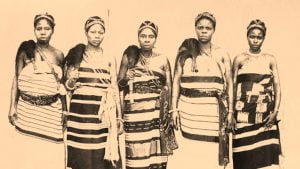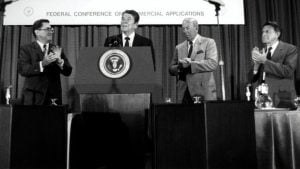Have you ever wondered how federalism started out in Nigeria? Of course, you must have asked that question if you are a good scholar who is interested in learning about federalism and its practice in the country. In this article, I will be explaining the origin and history of federalism in Nigeria. This article also describe the current practice of a federal system in the society.

Also see: Meaning and functions of the arms of government
The world is made up of different people from different race and tribes; the reflection of what is in the word is peculiar to what we see in some countries. While some countries have few race and ethnic groups, others have multiple races, languages and ethnicities. Where a country has few races, it is usually easy to adopt a method of governance other than federalism, but a country where the reverse is the case has to look for a suitable method or constitution that will satisfy all classes of races, languages, ethnicities, so as to avoid conflict while maintaining the unity of the country.
For example, the United States of America, Nigeria, Canada, Australia are some of the few countries having this type of features, the best system for them is a federal constitution that has principles of federalism. These principles give each federating units specified powers and independence to function while giving the federal government limited control.
Also see: Differences between cross offers and counter offers
Meaning of federalism
For us to understand the meaning of federalism, we must appreciate the meaning of federal and unitary constitutions. A constitution is said to be a federal constitution when it operates two levels of government, that is, the federal and state government, each of the level exercises its different powers without interference by the other level.
On the other hand, a constitution is unitary when there are two levels of government, that is, central and local government which is created by the law made by the central legislature and their existence depends upon the central government. The exercise of power by the local government is subject to control, supervision of the central government.
From the above explanation, one can rightly say that the constitution of Nigeria and United State of America are federal constitutions, while the constitution of France and The Republic of Ireland are unitary constitutions.

Origin/History of Nigerian Federalism
The history of federalism in Nigeria can however be traced from the amalgamation of the southern and Northern protectorates in 1914 by sir Lord Lugard. After the 1914 amalgamation, nothing much was done until the introduction of the Richard Constitution in 1946. This constitution recognized three regions in Nigeria namely, the Northern, Western and Eastern regions and the Colony of Lagos. This was the first time the idea of a federal system surfaced in the country.
The dissatisfaction of Nigerian Nationalists with the level of Nigerian participation in the government led to a number of constitutional reforms between 1951 and 1957. These reforms saw the gradual federalization of Nigeria Unitary Colonial State.
As the prospects for independence became clearer, Nigerian politicians withdrew into their ethnic cocoons to mobilize for comparative politics. Mutual fear and suspicion of domination among ethnic and goe-ethnic groups generated intense pressure on the colonial administration for a federal system.
In 1956, Eastern and Western Regions secured self-governing status while the Northern Region’s self government had to wait until 1959. By 1957, political diarchy had been established and Alhaji Abubarka Tafewa Balewa was made the first prime Minister of the country.
Nigeria attained her independence on 1st October 1960 after the federal elections in 1959. The 1960 Nigerian constitution provided for a Federation operating in the context of a parliamentary democracy. But this parliamentary system collapsed in January 1966 following a military coup.
The coup led to the death of many Northern leaders, the prominent amongst them were, the prime minister, the premiere of the Northern Region, Sir Ahmadu Bello, the minister of Defence (Ribadu), etc. After the coup, Nigeria was in turmoil as the coup plotters could not control the situation which brought in Aguyi Ironsi to power.
When Irosi took control as head of Military Government, he promulgated Decree 34 of 1966. This decree declared Nigeria a unitary system. The regime only lasted for 6 months because many feared that the system is not good for a country like Nigeria.
Consequently, in July 1966, another military coup started. This coup brought in the government of Yakubu Gowon’s administration. Decree No. 36 of 1966 was replaced by Gowon’s administration with Decree 52 of 1966, which returned Nigeria to a federal system headed by Federal Military Government. This position was retained by all seccessive military government that ruled Nigeria for almost thirty years.
The regional system operated by Irosi to maintain the unitary system was changed to state government with the adoption of Gowon’s Decree No. 52 which established 12 states from the former three regions in 1967.
The Murtala Mohammed’s regime came to power in 1976 and created seven more states to Become Nineteen, while Ibrahim Babangida’s Military Regime created two additional states in 1987, making a total of twenty one states and in 1991 he created nine more state bringing them to thiry states.
Finally, the Abacha Regime created six states more to become the thirty six states in Nigeria currently.
It must be noted that all the constitutions since independence in Nigeria adopted the principles of federalism. They always support the practice of two levels government, that is, the state and central government.

Recommended: Reasons why women do not participate in politics
Federalism in Nigeria today
The current Nigerian constitution (1999) also encourages federalism in so many ways. Firstly, the constitution divides the power of governance of the federation into two levels of government between the federal and state. The constitution also classified powers into Exclusive, Concurrent and Residual.
Powers under the exclusive list are for the federal government to legislate or control. Those under the concurrent list are for the state and federal government to legislate on and residual power are for the state to legislate on alone. According to the 1999 constitution, both members of the federal and state government must be elected into power by the electorates for a fix period of time (four years for the president and governor).
One interesting thing to note about the current Nigerian federalism is that, in performing their duties, where there is a conflict of duties between the federal and state government, it is upon the Judiciary to decide which power will be valid. The idea is that the courts in Nigeria is independent from the executive and legislative arm of the government.
Recommended: Features and characteristics of democracy in Nigeria
Conclusion:
From the above discussion facts, i believe you now understand the history and origin of federalism in Nigeria. One important thing you must note before leaving this page is that, the practice of Federalism in Nigeria was a necessity. It was necessary to discourage the domination of the government by one region of the country. It was also necessary to ensure equitable development in every region. Nonetheless, it should be forgotten that, federalism has its own disadvantages and Nigeria is technically facing some of those disadvantages today.

Edeh Samuel Chukwuemeka, ACMC, is a lawyer and a certified mediator/conciliator in Nigeria. He is also a developer with knowledge in various programming languages. Samuel is determined to leverage his skills in technology, SEO, and legal practice to revolutionize the legal profession worldwide by creating web and mobile applications that simplify legal research. Sam is also passionate about educating and providing valuable information to people.
This write up was helpful.
Thanks
Ader
Brief but informative about Nigerian Governance since beginning
Wow thanks a lot for telling me
But can you tell me about the features of federalism